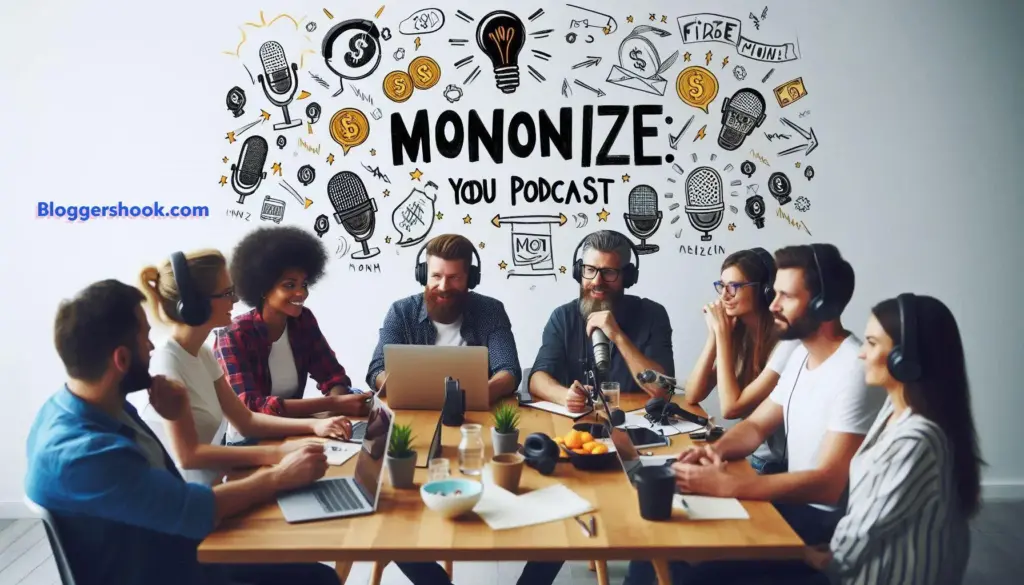Podcasting has exploded in popularity over the past decade, becoming a staple in the media landscape. From true crime and comedy to educational and niche hobby content, podcasts cater to a vast array of interests.
As this medium continues to grow, many content creators are exploring ways to turn their passion for podcasting into a profitable venture.
If you’re considering diving into the world of podcasting and want to know how to monetize your voice online, this comprehensive guide will provide you with the essential strategies and insights.

Understanding the Landscape
Before diving into monetization strategies, it’s crucial to understand the podcasting landscape. As of 2023, there are over two million podcasts available, with new shows being launched daily.
Despite this saturation, there is still ample opportunity for new voices to find their audience and generate income. The key is to produce high-quality content that resonates with listeners and stands out in a crowded market.
Building a Strong Foundation
To Make the most out of Your Podcasting, you need to build a strong foundation. It will improve your audience base and give you more reach. Let’s check out this in detail.
Identify Your Niche
The first step to successful podcast monetization is identifying your niche. Your podcast should cater to a specific audience with distinct interests.
Whether it’s a deep dive into 90s pop culture, a series on personal finance for millennials, or a show about urban gardening, finding a unique angle will help you attract dedicated listeners.
Create Quality Content
Content is king. To attract and retain an audience, your podcast needs to offer value, whether through entertainment, education, or inspiration.
Invest in good-quality recording equipment, edit your episodes meticulously, and ensure that your audio is clear and professional. Consistency is also crucial – releasing episodes on a regular schedule helps build and maintain a loyal audience.
Grow Your Audience
Monetization is largely driven by your audience size and engagement. Utilize social media platforms, your website, and email newsletters to promote your podcast.
Engage with your listeners through social media interactions, Q&A sessions, and listener shout-outs to build a community around your show. Collaborating with other podcasters and guest appearances can also help expand your reach.

Monetization Strategies
Once you have a solid foundation, you can explore and use various monetization strategies. Here are some of the most effective methods:
1. Sponsorships and Advertising
Sponsorships and advertising are among the most common ways to monetize a podcast. Here’s how it works:
CPM (Cost Per Mille)
CPM is a common advertising model where advertisers pay a set amount for every 1,000 downloads or impressions. The average CPM for a podcast ad can range from $18 to $50, depending on the show’s popularity and niche.
Direct Sponsorships
Direct sponsorships involve partnering with brands that align with your podcast’s content and audience. These deals can be more lucrative, as they are negotiated directly between you and the sponsor. It’s essential to approach brands that would genuinely benefit from exposure to your audience to ensure authenticity and effectiveness.
Dynamic Ad Insertion
Dynamic ad insertion allows you to insert ads into your podcast episodes after they’ve been published. This technology enables you to update ads as campaigns change, maximizing the potential for ad revenue from your entire back catalog.
2. Listener Donations and Crowdfunding
Another popular monetization method is relying on listener support. This can be done through platforms like Patreon, Buy Me a Coffee, or even through your own website. Here’s how:
Patreon
Patreon allows listeners to support your podcast with monthly contributions. In return, you can offer exclusive content, early access to episodes, merchandise, or other perks. This model works well if you have a dedicated and engaged audience.
PayPal and Other Donation Services
Some podcasters set up donation buttons on their websites using PayPal or similar services. This method allows listeners to make one-time or recurring donations without committing to a monthly subscription.
3. Premium Content and Membership Models
Offering premium content or creating a membership model can provide a steady income stream. This approach involves providing exclusive episodes, ad-free content, or bonus material to paying subscribers. Platforms like Supercast and Glow make it easy to set up a subscription service for your podcast.
4. Merchandise
Selling merchandise is another effective way to monetize your podcast. From branded T-shirts and mugs to stickers and posters, merchandise not only generates revenue but also helps promote your podcast. Online stores like Shopify or Teespring make it easy to design and sell custom products.
5. Live Shows and Events
Hosting live shows or events can be a lucrative way to monetize your podcast. Live podcast recordings, Q&A sessions, or even themed parties can draw in your audience and provide a new revenue stream. These events can be held in-person or virtually, depending on your audience’s location and preferences.
6. Affiliate Marketing
Affiliate marketing involves promoting products or services and earning a commission on any sales made through your referral links. This method works particularly well if you can seamlessly integrate product recommendations into your podcast content. Be transparent with your audience about your affiliate relationships to maintain trust.
7. Licensing and Syndication
If your podcast has high-quality content and a significant following, you may have opportunities to license your content to other platforms or syndicate it. This could involve allowing other platforms to distribute your podcast in exchange for a fee or creating content for podcast networks that pay for new shows.
Leveraging Analytics
Understanding your audience is crucial for successful monetization. Utilize podcast analytics tools to gather data on listener demographics, episode performance, and engagement. This information can help you tailor your content, attract sponsors, and refine your marketing strategies. Platforms like Anchor, Libsyn, and Podbean offer robust analytics to help you make data-driven decisions.
Legal and Ethical Considerations
As you monetize your podcast, it’s important to consider legal and ethical aspects:
Copyright and Intellectual Property
Ensure that you have the right to use any music, sound effects, or other copyrighted material in your podcast. Using copyrighted material without permission can lead to legal issues.
Transparency with Your Audience
Be transparent with your audience about monetization methods. Disclose when you’re running ads, using affiliate links, or sponsored content. Maintaining trust with your listeners is paramount for long-term success.
Contracts and Agreements
When entering into sponsorship deals or other business arrangements, make sure you have clear contracts outlining the terms and conditions. This protects both you and your partners and ensures a professional relationship.
Staying Adaptable
The podcasting landscape is constantly evolving, and staying adaptable is key to long-term success. Keep an eye on industry trends, explore new platforms and technologies, and be willing to pivot your strategies as needed.
Engaging with your audience and seeking feedback can also provide valuable insights into what’s working and what’s not.
Conclusion
Monetizing a podcast requires a combination of creativity, dedication, and strategic planning. By focusing on creating high-quality content, building a loyal audience, and leveraging multiple revenue streams, you can turn your passion for podcasting into a profitable venture.
Remember, the journey to monetization is a marathon, not a sprint. Stay patient, keep refining your approach, and enjoy the process of sharing your voice with the world.


